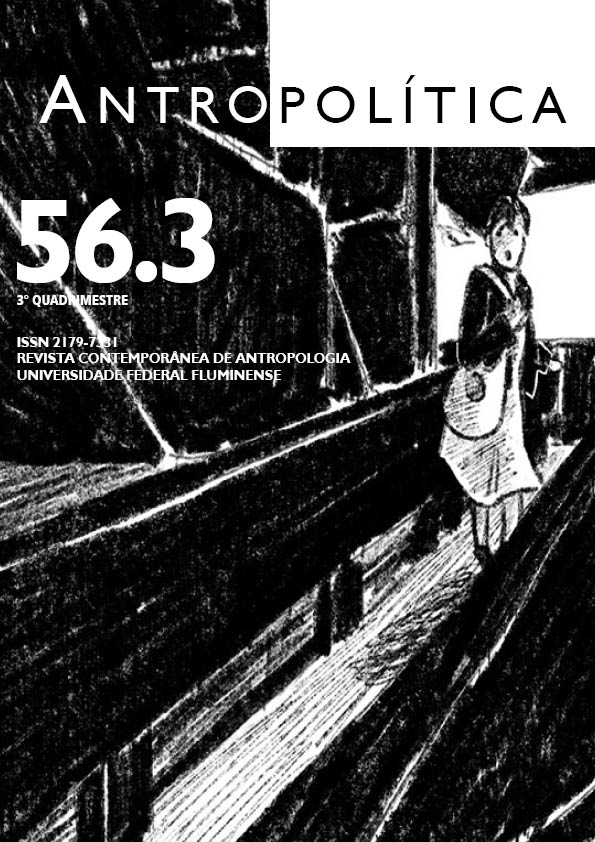Strong militancy in times of catastrophe: the role of collective action by the domestic service union during the pandemic
DOI:
https://doi.org/10.22409/antropolitica2024.v56.i3.a62952Keywords:
Trade union struggle, Domestic employment, Pandemic, Collectivity.Abstract
The book The unions of domestic workers in times of pandemic: memories and resistance builds, in many ways, an analysis of the role of the union movement in the pandemic, which leads to a reflection on its breadth and legacy. Its aim is to reflect on the organization of domestic work and the central role of domestic workers’ unions in the struggle for rights for domestic workers. Due to the specific nature of domestic work, its unionization process was late, being legalized only recently. The book shows how this was possible because it was collectively founded by the struggle of several domestic workers and their networks. During the pandemic, the collective aspects was not changed, but new strategies were developed to adapt to the “new normal”, which aimed to reduce the impact on the lives of workers who were already suffering from precariousness even before this context. The book uses as its methodology the presentation of quantitative data from research carried out by different institutions, and the construction of dialogues that highlight memories and the legacy of collective struggle. In this sense, the discussion presented throughout the eight chapters presents the actions taken by the domestic workers’ unions, which aimed to protect them in catastrophic times, but also to welcome them and guarantee their dignity.
Downloads
References
ACCIARI, Louisa; BRITO, Chirlene dos Santos. Impactos da crise pandêmica no trabalho doméstico: velhas causas, novas consequências. In: PINTO, Cleide Pereira et al. (org.). Os sindicatos das trabalhadoras domésticas em tempos de pandemia: memórias da resistência. Santa Maria: FACOS, 2021. p. 31-51.
BERNADINO-COSTA, Joaze. Sindicatos das trabalhadoras domésticas no Brasil: teoria da descolonização e saberes subalternos. 2007. Tese (Doutorado em Sociologia) – Departamento de Sociologia, Universidade de Brasília, Brasília, 2007.
BRASIL. Lei complementar n. 150, de 1 de junho de 2015. Dispõe sobre o contrato de trabalho doméstico. Brasília, DF: Presidência da República, 2015. Disponível em: https://www.planalto.gov.br/ccivil_03/leis/lcp/lcp150.htm. Acesso em: 13 maio 2024.
CASTRO, Mary Garcia. Introdução. In: PINTO, Cleide Pereira et al. (org.). Os sindicatos das trabalhadoras domésticas em tempos de pandemia: memórias da resistência. Santa Maria: FACOS, 2021. p. 12-29.
PINTO, Cleide Pereira et al. (org). Os sindicatos das trabalhadoras domésticas em tempos de pandemia: memórias da resistência. Santa Maria: FACOS, 2021. Disponível em: https://www.ufsm.br/editoras/facos/os-sindicatos-das-trabalhadoras-domesticas-em-tempos-de-pandemia-memorias-da-resistencia. Acesso em: 19 set. 2024.
Published
How to Cite
Issue
Section
License
Copyright (c) 2024 Adara Pereira da Silva

This work is licensed under a Creative Commons Attribution 4.0 International License.
O conteúdo da revista Antropolítica, em sua totalidade, está licenciado sob uma Licença Creative Commons de atribuição CC-BY (http://creativecommons.org/licenses/by/4.0/deed.pt).
De acordo com a licença os seguintes direitos são concedidos:
- Compartilhar – copiar e redistribuir o material em qualquer suporte ou formato;
- Adaptar – remixar, transformar, e criar a partir do material para qualquer fim, mesmo que comercial;
- O licenciante não pode revogar estes direitos desde que você respeite os termos da licença.
De acordo com os termos seguintes:
- Atribuição – Você deve informar o crédito adequado, fornecer um link para a licença e indicar se alterações foram feitas. Você deve fazê-lo em qualquer maneira razoável, mas de modo algo que sugira que o licenciante o apoia ou aprova seu uso;
- Sem restrições adicionais — Você não pode aplicar termos jurídicos ou medidas de caráter tecnológico que restrinjam legalmente outros de fazerem algo que a licença permita.


